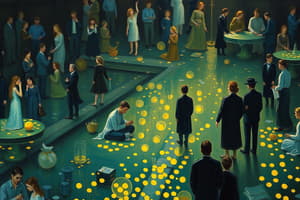Podcast
Questions and Answers
What are the differences between manifest and latent functions?
What are the differences between manifest and latent functions?
- Latent functions are recognized consequences.
- Manifest functions are recognized and intended consequences. (correct)
- Manifest functions are unrecognized consequences.
- Latent functions are recognized and intended consequences.
What does Social Function Theory explain?
What does Social Function Theory explain?
It explains a complex strategy for meeting human needs and different ways of life function.
What is social conflict rooted in?
What is social conflict rooted in?
Materialism.
What does symbolic interaction focus on?
What does symbolic interaction focus on?
What is a survey?
What is a survey?
What does an experiment do?
What does an experiment do?
What is observation?
What is observation?
What was Zimbardo's prison study about?
What was Zimbardo's prison study about?
What are mores?
What are mores?
What are symbols in culture?
What are symbols in culture?
What are folkways?
What are folkways?
What do horticulture societies use?
What do horticulture societies use?
What characterizes agrarian societies?
What characterizes agrarian societies?
What defines an industrial society?
What defines an industrial society?
What describes a postindustrial society?
What describes a postindustrial society?
What is a subculture?
What is a subculture?
What characterizes counterculture?
What characterizes counterculture?
What is ethnocentrism?
What is ethnocentrism?
What is cultural relativism?
What is cultural relativism?
What are three causes of cultural change?
What are three causes of cultural change?
What is global economy?
What is global economy?
What does global communication refer to?
What does global communication refer to?
What is global migration?
What is global migration?
What did Harlow study?
What did Harlow study?
What did Kohlberg explain about moral reasoning?
What did Kohlberg explain about moral reasoning?
What is the preconventional level of moral development?
What is the preconventional level of moral development?
What characterizes the conventional level of moral development?
What characterizes the conventional level of moral development?
What is the postconventional level of moral development?
What is the postconventional level of moral development?
What does Erikson's theory of socialization focus on?
What does Erikson's theory of socialization focus on?
Trust vs. _____ refers to a socialization stage that develops in infants.
Trust vs. _____ refers to a socialization stage that develops in infants.
Autonomy vs. _____ is a stage that shows the child's growth from about a year and a half to three years.
Autonomy vs. _____ is a stage that shows the child's growth from about a year and a half to three years.
Initiative vs. _____ is seen in four to five-year-olds.
Initiative vs. _____ is seen in four to five-year-olds.
Industriousness vs. _____ takes place between the ages of six and thirteen.
Industriousness vs. _____ takes place between the ages of six and thirteen.
Identity vs. _____ is a stage experienced by many teenagers.
Identity vs. _____ is a stage experienced by many teenagers.
Intimacy vs. _____ reflects the struggle for intimate relationships.
Intimacy vs. _____ reflects the struggle for intimate relationships.
Making a difference vs. self-absorption is a stage in which individuals contribute to others' lives.
Making a difference vs. self-absorption is a stage in which individuals contribute to others' lives.
Integrity vs. _____ occurs at the end of life, questioning missed opportunities.
Integrity vs. _____ occurs at the end of life, questioning missed opportunities.
What is resocialization?
What is resocialization?
What is a primary group?
What is a primary group?
What is a secondary group?
What is a secondary group?
What did Stanley Milgram study?
What did Stanley Milgram study?
What is a normative organization?
What is a normative organization?
What is a coercive organization?
What is a coercive organization?
What is a utilitarian organization?
What is a utilitarian organization?
Bureaucratic __________ is a focus on rules and regulations that can interfere with an organization.
Bureaucratic __________ is a focus on rules and regulations that can interfere with an organization.
Bureaucratic __________ describes the downsizing of individuals into small cogs in a mechanism.
Bureaucratic __________ describes the downsizing of individuals into small cogs in a mechanism.
Bureaucratic __________ refers to the tendency of bureaucratic organizations to perpetuate themselves.
Bureaucratic __________ refers to the tendency of bureaucratic organizations to perpetuate themselves.
What are the requirements for a bureaucracy according to Max Weber?
What are the requirements for a bureaucracy according to Max Weber?
What does specialization refer to in bureaucracy?
What does specialization refer to in bureaucracy?
What is the hierarchy of offices?
What is the hierarchy of offices?
What are rules and regulations in a bureaucracy?
What are rules and regulations in a bureaucracy?
What is technical competence?
What is technical competence?
What does impersonality mean in bureaucracy?
What does impersonality mean in bureaucracy?
What is formal, written communication in bureaucracy?
What is formal, written communication in bureaucracy?
What are the aspects of McDonaldization according to George Ritzer?
What are the aspects of McDonaldization according to George Ritzer?
What does efficiency refer to in McDonaldization?
What does efficiency refer to in McDonaldization?
What does uniformity mean in McDonaldization?
What does uniformity mean in McDonaldization?
What does control signify in McDonaldization?
What does control signify in McDonaldization?
What causes cultural change?
What causes cultural change?
What are the culture ingredients?
What are the culture ingredients?
Who coined the phrase 'McDonaldization'?
Who coined the phrase 'McDonaldization'?
What is classical conditioning?
What is classical conditioning?
What is operant conditioning?
What is operant conditioning?
Who was John Watson?
Who was John Watson?
Flashcards are hidden until you start studying
Study Notes
Differences Between Functions
- Manifest functions are the intended consequences of social patterns, while latent functions are unintended and unrecognized.
- Social-conflict theory, symbolic interactionism, and structural functionalism offer distinct perspectives on society's functions.
Social Function Theory
- Explains strategies for meeting human needs and helps in understanding the functionality of different lifestyles.
Social Conflict
- Rooted in materialism, contrasting with Social Function Theory.
Symbolic Interaction
- A framework that views society as a product of everyday individual interactions.
Research Methods
- Survey: Participants provide details through structured questions.
- Experiment: Involves manipulation of variables to observe effects.
- Observation: Involves recording behaviors without interference.
Zimbardo's Prison Study
- Assigned roles of guards and prisoners, halted after six days due to negative participant behavior, showcasing that context can lead to moral failures.
Cultural Norms
- Mores: Norms with significant moral implications (e.g., laws against child molestation).
- Folkways: Norms for casual interactions, like dress etiquette.
Societal Structures
- Horticulture Societies: Rely on hand tools for crop cultivation; linked to belief in a higher power due to vulnerability to nature.
- Agrarian Societies: Employ plowing and machinery; leads to social inequality as men dominate.
- Industrial Society: Uses energy for manufacturing; enhances living standards but may harm nature.
- Postindustrial Society: Centralizes technology and information systems, shifting skill definitions and promoting symbolic culture.
Cultural Dynamics
- Subculture: Distinct patterns within a society, problematic in categorizing individuals due to overlapping memberships.
- Counterculture: Patterns that oppose societal norms.
- Ethnocentrism: Judging another culture by one's own standards.
- Cultural Relativism: Evaluating a culture based on its own context.
Causes of Cultural Change
- Influenced by global economic flows, communication networks, and migration patterns.
Research Contributions
- Harlow's Study: Highlighted the need for physical stimulation in emotional development through primate studies.
- Kohlberg's Moral Reasoning: Identifies three levels—preconventional, conventional, and postconventional—where moral growth varies among individuals.
Erikson's Stages of Socialization
- Lifelong process influencing personality development through various socialization stages, including:
- Trust vs. Mistrust (infants)
- Autonomy vs. Shame and Doubt (toddlers)
- Initiative vs. Guilt (preschoolers)
- Industry vs. Inferiority (school-aged children)
- Identity vs. Role Confusion (teenagers)
- Intimacy vs. Isolation (young adults)
- Generativity vs. Stagnation (adulthood)
- Integrity vs. Despair (old age)
Organizational Structures
- Primary Group: Contains close ties, such as family and friends.
- Secondary Group: Includes less personal relationships, like coworkers or classmates.
- Normative Organizations: Engage in morally worthwhile goals.
- Coercive Organizations: Involve involuntary membership, often for punishment.
- Utilitarian Organizations: Aim for economic gain, often based on necessity.
Bureaucratic Features
- Weber's Requirements: Specialization, hierarchy, rules, technical competence, impersonality, and formal communication define bureaucracies.
- Elements encompass specialization of tasks, a pyramid structure for oversight, and adherence to rules for predictable behavior.
McDonaldization
- Efficiency, Uniformity, Control: Key aspects that characterize modern organizational structures, sacrificing individual variance for process optimization.
Learning Theories
- Classical Conditioning: Associative learning using stimuli.
- Operant Conditioning: Learning via consequences, emphasizing reinforcement and punishment.
- John Watson: Behaviorist who applied these conditioning principles to human behavior studies.
Studying That Suits You
Use AI to generate personalized quizzes and flashcards to suit your learning preferences.



